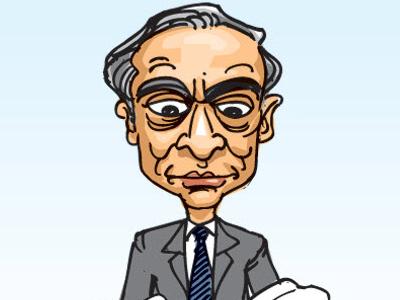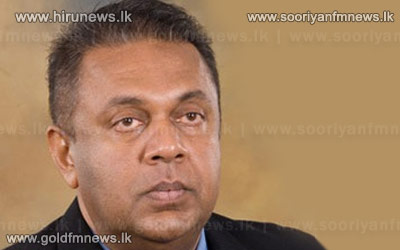Foreign Minister Mangala Samaraweera yesterday warned that unless tangible action was taken to restore what he called judicial credibility, ongoing external investigations could lead to Sri Lankan armed forces personnel as well as civilians appearing before an international war crimes tribunal. Minister Samaraweera was participating in a debate at the time of adjournment of House on the removal of Chief Justice Mohan Peiris.
Foreign Minister said: “An international inquiry, initiated last year, is now currently nearing completion. The results of this inquiry could lead to Sri Lankan armed forces and other civilians appearing before an international tribunal, unless tangible steps are swiftly taken to restore judicial credibility. It is the previous administration’s failure to set-up credible domestic mechanisms that has led to our current difficulties. It is the current government’s position that the most effective way of beginning the process of healing between communities and preventing international prosecution, which many feel would be a violation of sovereignty, would be to institute a credible domestic mechanism as soon as possible. The challenge today is to ensure that we are able to effectively enjoy the rights, privileges and benefits of re-entering the community of civilized nations; and ensure that we, as a country, do not suffer economic sanctions, indignity and a tarnished reputation because we fear justice or because we are too short sighted to be able to pursue the ends of justice in a credible manner ourselves.
In a statement issued by Mohan Pieris in The Sunday Island (Feb. 1, 2015 edition), he said “maintaining the dignity and decorum associated with the office of the Chief Justice and ensuring its respectability and propriety is [his] prime concern. As the pinnacle of our judicial administration, it should be safeguarded in its pristine purity; now and for the future – in the need to preserve justice as a wholesome entity.” Like a harlot extolling the virtues of virginity, Mohan Peiris, who brought international disrespect and condemnation to our judicial system by his scandalous appointment two years ago, and his conduct since then, is now shedding tears for the ‘pristine purity’ of the office of the Chief justice.

There are reasons both substantive and procedural – which others today have gone into in greater depth – for why Mohan Peries was not lawfully appointed to the office of Chief Justice. Since he claims to be an expert of ‘unconstitutional processes’ then he is well aware of the degree of unconstitutionality that attended the eviction of the legitimate chief justice from her rightful chair and by which he, escorted by STF and armed guards, took up that seat and functioned there, in an manner equally unconstitutional as his ascension. He is also well aware then of all that he has done to degrade the judiciary, its dignity, independence, objectivity and reputation for over two years.
Mohan Peiris recently stated that separation of powers is a fundamental feature of our Constitution. It is in the spirit of his own words, then that I recommend that someone who was the Legal Adviser to the Cabinet, Chairman of the Seylan Bank, Director of Lanka Logistics (the arms purchasing unit of the Ministry of Defence), Director of Rakna Lanka Security (a security company established by Defence Secretary Gotabhaya Rajapakse), Legal Adviser in the Ministry of Defence, Attorney General, government spokesperson before the UN Human Rights Council to refute allegations of war crimes, and importantly a close and partial ally of the former President should not also hold the post of ‘de facto’ chief justice.
The ‘dignity’ of the judiciary, which Mohan so nobly talks of, is dependent on its impartiality and objectivity, as well as its independence from the executive and legislature. It also requires that the head of that system commands the respect of the community of lawyers, who in this case have been propelled to be the champions of restitution for the former chief of justice. Under Mohan Peries’ tenure, this illusory dignity and independence was a cobweb of conflicting interests, and Mohan Peries was in actuality an appendage of the state apparatus.
The Bangalore Principles of Judicial Conduct – the international gold standard – states that “A judge shall not only be free from inappropriate connections with, and influence by, the executive and legislative branches of government, but must also appear to a reasonable observer to be free therefrom”. Did Mohan Peries give any thought to the sanctity of his judicial office when, on 14th April last year, he travelled from Colombo to Tangalle, apparently in the company of Gotabhaya Rajapakse, to join President Rajapakse and his immediate family in celebrating the Sinhala and Hindu New Year, and join in feeding milk rice to each other at the auspicious time? Did Mohan Peries think it was part of his job description to become a member of President Rajapakse’s entourage on an official visit to Italy and the Vatican in September last year? Did Mohan Peries give any thought to the public perception of the Supreme Court when he begged for a diplomatic appointment from the executive branch of government? Is driving down to the home of a presidential candidate on election night to provide him with legal advice (as he claims he did) part of the duties of a Chief Justice?
I hope the honourable members of Parliament remember that I have made a complaint to the CID based on reliable information that Mr. Mohan Peries was part of the conspiracy to prevent this government taking office – attempting to impede the one democratic process most crucial to the proper functioning of our society. It is clear, from all that can be seen of this man’s outward actions, transactions and relationships that he has acted in complete violation of the International standards of Judicial Conduct and therefore cannot be expected to command the respect and confidence of the international community, or of any honest Sri Lankan expecting accountability and transparency in a court of law.
Honourable Members will recall the international backlash that attended the removal of the 43rd Chief Justice Shirani Bandaranayake two years ago. Statements condemning the move and calling for her reinstatement were made by several Governments, the UN Special Rapporteur on the Independence of the Judiciary, the International Commission of Jurists, the International Bar Association and the Bar Associations of several countries. The Secretary-General of the Commonwealth, which we currently chair, expressed the “Commonwealth’s profound collective concern” at what “could be perceived to constitute violations of core Commonwealth values and principles”.
45 Judges from all the continents wrote to President Rajapakse urging him to act immediately to restore the independence of the judiciary by reinstating the legal Chief Justice. The UN High Commissioner for Human Rights described the removal of the Chief Justice “through a flawed process” as a “gross interference with the independence of the judiciary and a calamitous setback for the rule of law in Sri Lanka.” She questioned how anyone could have any confidence in the independence and impartiality of Mohan Peries when handling allegations of serious human rights violations by the authorities. Cases against his installation as the Chief Justice were ruled on or dismissed by benches appointed by Mohan Pieris – a respondent in the cases himself, an extreme violation of the fundamental principle of natural justice, that ‘no man shall be a judge in his own case’.
And in the two years in which Mohan Peries was in power, credibility continued to wane. He was, after all, the person who informed the UN Committee on Torture that journalist Ekneligoda was comfortably and safely living in a certain country; and when called upon by a court of law to disclose which country that was, replied that “only god knows”. The many victims of Mohan Peries’ tenure include, but are not limited to, PTA prisoner Ganesan Nimalaruban, the Slave Island evictees, who were banished in the name of development and the victims of the Welikada Prison riot.

It is a notorious fact that in two cases in which supporters of the former government were brought as suspects before magistrates for assaulting opposition supporters during the last presidential election campaign, that Mr. Mohan Peries called these magistrates and ordered them to grant bail to the suspects. Even the records of the Committee Against Torture, the treaty body of the Convention against Torture, would bear testimony to the fact that Mr. Mohan Peris lied before it and was thereafter called a liar by one its members. This was judicial corruption at its best. Mohan Peries was without dispute at the rotten core of the institutional mechanism that stands accused of committing egregious violations of human rights and crimes against humanity.
Mohan Peiris’s record of abuse
Not many of you may be aware that in November 2013, Mohan Peries attended a conference of Chief Justices of the Asian and Pacific Region, convened by the Chief Justice of the Republic of Turkey and the United Nations, uninvited. The Sri Lankan judiciary had been deliberately excluded in view of the events of January of that year. Neither the UN nor the Turkish judiciary recognized Mohan Peries as the Chief Justice of Sri Lanka. Yet he travelled to Istanbul with his wife, demanded that he be accommodated in the conference hotel, attended the conference and participated in the discussions, without being recognized as a participant. On leaving Istanbul, he demanded that his airfare be reimbursed in cash. The Istanbul Declaration on Transparency in the Judicial Process, which was adopted at that conference, does not bear his name, nor does it recognize Sri Lanka as a participating country. The Bangalore Principles of Judicial Conduct require judges not to do anything that detracts from the dignity of judicial office, however what Mohan Peries has done will detract from the dignity and reputation of our judiciary for many years to come.
As the Minister of Foreign Affairs, it my duty and responsibility to promote and safeguard the interests, integrity and sovereignty of Sri Lanka. One of the principal issues I have been called upon to address upon assuming my office is the ongoing inquiry being conducted under the auspices of the United Nations Human Rights Council into war crimes and violations of international human rights and humanitarian law alleged to have been committed in this country.
If I am to convince the international community that we in Sri Lanka are quite capable of dealing with these matters ourselves, through domestic mechanisms, and that there is no need for our citizens to be brought before international tribunals, I have to be able to claim, honestly and sincerely, that we have in this country a judiciary that is competent, independent and impartial; a judiciary that can rank among the best anywhere in the world. Of course, once we did have such a judiciary; but that was a long time ago.
Because of the many regressions we have made, we have a long way yet to go before we can change perceptions and prove that we as a country can institute a domestic mechanism that is as effective and as just as any proposed international mechanism. We hope that under the new Chief Justice, and the reforms we propose to introduce, that we will be able to raise the judiciary from the depths to which it has sunk to one that conforms to contemporary international standards and the essential requirements of a democratic, multi-ethnic, multi-religious and multi-linguistic state. That is the principal reason for my intervention in this debate.”
The Island